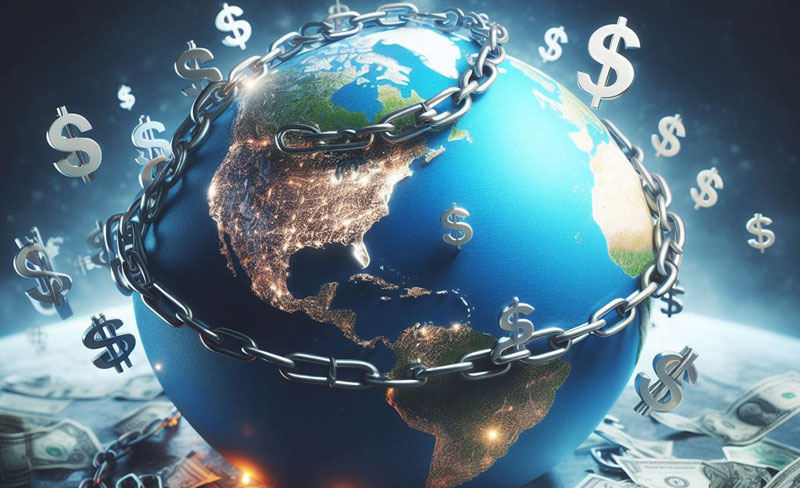Highlights:
- The U.S. dollar’s dominance in global transactions and reserves poses challenges for the global economy.
- Economic impacts of the dollar’s role include benefits to the U.S. but also potential risks to global stability.
- Political ramifications of dollar nationalism could lead to significant shifts in global economic dynamics.
The U.S. Dollar as a Global Currency
The U.S. dollar plays a dominant role in global transactions, accounting for a vast majority of international currency transactions and global reserves. This has significant implications for the global economy.
Economic Impact and Global Dependence
The dollar’s role as a reserve currency supports the U.S. current account deficit but also shifts the U.S. economy away from traded goods, creating both benefits and challenges for the global economy.
The Federal Reserve’s Role
The extensive use of the dollar gives the Federal Reserve significant influence over global economic dynamics, with U.S. financial sanctions often impacting international markets.
Fluctuating Systems and Political Ramifications
The current scenario, with a strong dollar and high U.S. interest rates, poses challenges for global economic stability. Exchange rate fluctuations and political responses could further complicate the situation.
Impact on Emerging Markets
Emerging market economies are particularly sensitive to fluctuations in the dollar, with recent interest rate hikes impacting lending to these countries and posing challenges for institutions like the IMF and World Bank.
Political Dynamics in the U.S.
The Biden administration and previous administrations have had differing views on the impact of a strong dollar, with implications for U.S. economic policies and global economic stability.
Dollar Dynamics and Future Uncertainties
The U.S. established its dollar system in 1944 at Bretton Woods, with President Richard Nixon first disrupting it in the early 1970s. Following the 2008 financial crisis, the U.S. led a new era of quantitative easing. Now, the question for 2024 is whether the ongoing crisis in American democracy might spill over into the global economy.
Recent trends in U.S. inflation hint at a possible relief, with core inflation showing signs of easing after six months. However, the core consumer price index’s rapid rise remains a concern for Federal Reserve policymakers, who are carefully considering the timing of potential interest rate adjustments.
This week, economic reports on producer prices, housing starts, and industrial production are expected to provide more insights. Fed Chair Jerome Powell and other regional Fed presidents are scheduled to discuss these issues, adding to the market’s anticipation.
The resilience of American consumers poses a challenge to the Fed’s inflation targets. Despite strong retail sales in early 2024, projections suggest a potential slowdown. The interplay between U.S. politics, economic policies, and the strength of the dollar will continue to shape not just the national economy but also global economic trends.
The dominant position of the U.S. dollar in global transactions and reserves presents both opportunities and challenges for the global economy. While this has facilitated international economic activity, challenges such as exchange rate fluctuations and political responses could impact global stability. The future role of the dollar in the global economy will depend on how these challenges are addressed and how political and economic dynamics evolve in the future.
James Nolan is a Senior Editor at VOU (voiceofusa.com) Finance, running newsletters. Follow her on Twitter @James Nolan.
Here are some resources for further information:
More on VOU
The Persistence of Unhealthy Diets in the United States: An Examination
Highlights The State of American Diets Recent research from Tufts University, published in the Annals of…
Here’s Why Refined Sugar is a Slow Poison According to Nutritionists
Highlights White sugar, also known as refined sugar, is a staple in many diets worldwide. While…
ByteDance Teams Up with Broadcom and TSMC to Develop 5nm AI Chip
Highlights: ByteDance’s Strategic Move in AI Chip Development TikTok’s parent company, ByteDance, has embarked on a…
Apple and Meta Eyeing AI Partnership
Highlights Apple and Meta’s AI Vision Apple is reportedly in talks with Meta to explore a…





